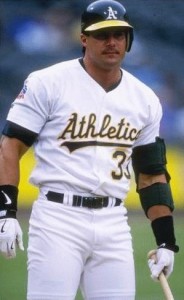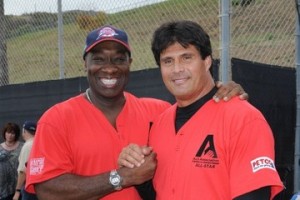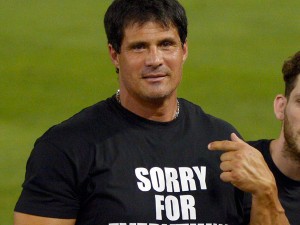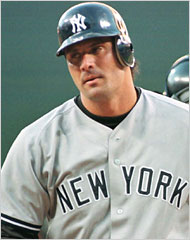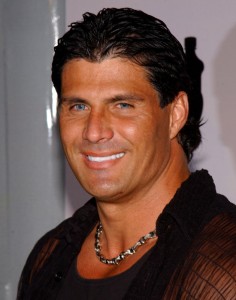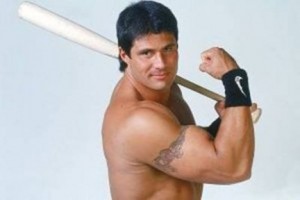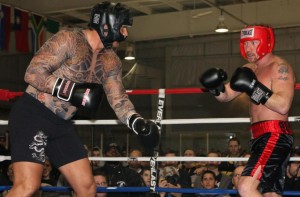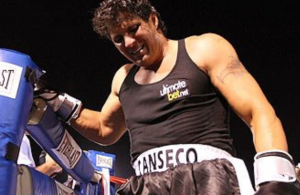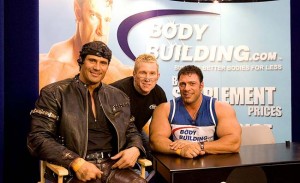 José Canseco Capas, Jr. (born July 2, 1964), is a Cuban-American former Major League Baseball (MLB) outfielder, and designated hitter.
José Canseco Capas, Jr. (born July 2, 1964), is a Cuban-American former Major League Baseball (MLB) outfielder, and designated hitter.
Canseco was born in Havana, Cuba, and left Cuba with his cousins and family when he and his identical twin brother were infants. They relocated to the United States, with José and Ozzie growing up in the Miami, Florida area, and attending Coral Park High School.
Minor league baseball (1982–1985)
The Oakland Athletics drafted Canseco in the 15th round of the 1982 Major League Baseball Draft. He played minor league baseball with the Madison Muskies, Idaho Falls A’s, and the Modesto A’s. Canseco started the 1985 season with the Class-AA Huntsville Stars and became known as “Parkway Jose”,for his long home runs (25 in half a season), that went close to the Memorial Parkway behind Joe Davis Stadium.
Baseball career (1982–present).
In 1985, Canseco won the Baseball America Minor League Player of the Year Award, and was a late season call-up for the Oakland Athletics. He made his Major League debut on September 2 and struck out in his one at-bat against the Baltimore Orioles. His first hit was off Ron Guidry of the New York Yankees on September 7. and his first home run was off Jeff Russell of the Texas Rangers on September 9. He played in 29 games in the major leagues in 1985. He established himself in 1986, his first full season, being named the American League’s Rookie of the Year (the first by an Athletic since Harry Byrd in 1952 with what were then the Philadelphia Athletics), with 33 home runs and 117 runs batted in. In 1987, Mark McGwire joined Canseco on the Athletics; McGwire hit 49 home runs that year and was also named the American League Rookie of the Year. Together, he and Canseco formed a fearsome offensive tandem, known as the “Bash Brothers”.
Canseco with the A’s in 1989.
In April of 1988, Canseco guaranteed he would hit at least 40 home runs and steal at least 40 bases in the upcoming season. He went on to record 42 home runs and 40 steals becoming the first player in MLB history to hit the 40-40 mark in a single season (a fact unaware to him at that time). In recognition of his record the street in front of his former high school was named after him but was later rescinded in 2008 after he admitted to previously using drugs throughout his career. That same year, he helped the Athletics to the World Series but they lost to the Los Angeles Dodgers in five games. Canseco was unanimously named the American League’s Most Valuable Player in 1988, with a .307 batting average, 120 runs scored, 124 RBI, 42 home runs, and 40 stolen bases.
In 1989, Canseco missed all but 65 of the regular season games with a broken wrist, but he still managed to hit 17 home runs as the Athletics won their first World Series since 1974, beating the San Francisco Giants in four games. The 1989 Series was interrupted before Game 3 by a major earthquake in the San Francisco Bay Area.
Canseco came back to form in 1990, hitting 37 home runs despite being hampered in the latter part of the season by what would become a recurring back problem. The A’s returned to the World Series once again, but were swept by the Cincinnati Reds in four games. Canseco continued to be productive, hitting 44 home runs in 1991.
Texas Rangers (1992–94).
On August 31, 1992, in the middle of a game and while he was in the on-deck circle, the A’s traded Canseco to the Texas Rangers for Rubén Sierra, Jeff Russell, and Bobby Witt.
On May 26, 1993, during a game against the Cleveland Indians, Carlos Martínez hit a fly ball that Canseco lost sight of as he was crossing the warning track. The ball hit him in the head and bounced over the wall for a home run. The cap Canseco was wearing on that play, which This Week in Baseball rated in 1998 as the greatest blooper of the show’s first 21 years, is in the Seth Swirsky collection. After the incident, the Harrisburg Heat offered him a soccer contract. Three days later, Canseco asked his manager, Kevin Kennedy, to let him pitch the eighth inning of a runaway loss to the Boston Red Sox; he injured his arm, underwent Tommy John surgery, and was lost for the remainder of the season. In his pitching appearance, Canseco allowed three earned runs on two hits and three walks, throwing 33 pitches, but only 12 for strikes.
In the 1994 strike shortened season, Canseco again returned to his former status of power hitter with 31 home runs and 90 RBI in 111 games. Canseco also stole 15 bases and posted a .282 batting average. He was named comeback player of the year in 1994, and finished in eleventh place in the American League Most Valuable Player voting.
Final MLB seasons (1995–2001).
After playing with the Rangers from 1992 to 1994, Canseco moved on to play with the Boston Red Sox from 1995 to 1996. Following an unsuccessful return with the A’s in 1997, Canseco did have a productive season again with the Toronto Blue Jays in 1998, when he hit 46 home runs and stole 29 bases, the most he had stolen since the 40 he stole in 1988. He won the AL Silver Slugger award, but his comeback was missed by most fans because of the home run race in the National League between Mark McGwire and Sammy Sosa.
Canseco went to the Tampa Bay Devil Rays in 1999, where he hit 34 home runs in 114 games and was named to the AL All-Star team, until he injured his back and was lost for the season. He was claimed off waivers by the New York Yankees in August 2000, which caught many, including Yankees manager Joe Torre off guard, as the Yankees had four other players who fulfilled a similar role to Canseco. Yankees General Manager Brian Cashman made the claim to prevent the Blue Jays, who were in a close race with the Yankees, from acquiring Canseco. He made one appearance in the 2000 World Series against the New York Mets and earned his second World Series ring when they defeated the Mets in five games. Despite this achievement Canseco later called his Yankees tenure “the worst time of [his] life” due to receiving limited playing time.
Canseco played with the Chicago White Sox in 2001, after being cut by the Anaheim Angels in spring training and spending half of the season with the Newark Bears of the independent Atlantic League. In 2002, Canseco was signed by the Montreal Expos but was released prior to the regular season. Canseco retired in May 2002. He made a brief comeback attempt in 2004, but was not offered a spot with the Los Angeles Dodgers after a spring fling.
Awards.
His 462 career home runs rank him 32nd on the MLB all-time list. Canseco was at one time the all-time leader in home runs among Latino players; he was later surpassed by Manny Ramirez, Carlos Delgado, Rafael Palmeiro, Alex Rodriguez, and Sammy Sosa. Canseco has been distinguished four times with the Silver Slugger award: three times as an AL outfielder in 1988, 1990, and 1991, and once as a Designated Hitter in 1998.
Independent League career (2006-present).
Typically a designated hitter, Canseco has taken to the mound as a pitcher several times with Yuma.
On June 29, 2006, the independent Golden Baseball League announced Canseco had agreed to a one-year contract to play with the San Diego Surf Dawgs. The League said Canseco had agreed to be subjected to its drug-testing policy “that immediately expels any players found using steroids or illegal drugs.” After playing one game for the Surf Dawgs, Canseco was traded to the Long Beach Armada on July 5, 2006. He requested the trade due to “family obligations.” On July 31, 2006, Canseco won the Golden Baseball League’s Home Run Derby.
Canseco signed a short team deal with the Laredo Broncos of the United Baseball League on August 14, 2010. He served as bench coach and designated hitter.
On April 11, 2011, Canseco signed a deal as a player/manager for the Yuma Scorpions of the North American League. Canseco joined the Quintana Roo Tigres of the Mexican League in 2012, but was reportedly banned for using testosterone.
On April 20, 2012, the Worcester Tornadoes, of the Canadian American Association of Professional Baseball, announced that they had signed Canseco to a one-season contract for a salary of one thousand dollars a month. In the beginning of August 2012, Canseco left the Tornadoes due to concerns of not receiving his salary, a conflict which led him to sue the team. Canseco quickly signed with the Rio Grande Valley WhiteWings of the North American League. However, though his debut was delayed due to a family emergency.
In early 2013 Canseco played in the Texas Winter League but was only 3 for 16 at the plate. He signed with the Fort Worth Cats of the United League to start the 2013 season.
Steroids.
In 2005, Canseco admitted to using anabolic steroids with Jorge Delgado, Damaso Moreno and Manuel Collado in a tell-all book, Juiced: Wild Times, Rampant ‘Roids, Smash Hits & How Baseball Got Big. Canseco also claimed that up to 85% of major league players took steroids, a figure disputed by many in the game. In the book, Canseco specifically identified former teammates Mark McGwire, Rafael Palmeiro, Jason Giambi, Iván Rodríguez and Juan González as fellow steroid users, and admitted that he injected them. Most of the players named in the book initially denied steroid use, though Giambi admitted to steroid use in testimony before a grand jury investigating the BALCO case and on January 11, 2010, McGwire admitted publicly to using steroids.
At a Congressional hearing on the subject of steroids in sports, Palmeiro categorically denied using performance-enhancing drugs, while McGwire repeatedly and somewhat conspicuously refused to answer questions on his own suspected use, saying he “didn’t want to talk about the past.” Canseco’s book became a New York Times bestseller. On August 1, 2005, Palmeiro was suspended for 10 days by Major League Baseball after testing positive for steroids.
On December 13, 2007, José Canseco and Jorge Delgado were cited in the Mitchell Report to the Commissioner of Baseball of an Independent Investigation Into the Illegal Use of Steroids and Other Performance Enhancing Substances by Players in Major League Baseball. On December 20, 2007, Canseco was also named in Jason Grimsley’s unsealed affidavit as a user of steroids. Canseco and Grimsley were teammates on the 2000 New York Yankees.
On December 30, 2007, it was announced that Canseco has reached a deal for his sequel to Juiced. The new book is Vindicated, which Canseco’s lawyer, Robert Saunooke, said would hit bookstores by Opening Day 2008. This book is said to have information on Alex Rodriguez, and Albert Belle as suggested by Canseco. The book will be a “clarification” of names that should’ve been mentioned in the Mitchell Report. On January 5, 2008, a potential editor for his upcoming book, Don Yaeger, a former Sports Illustrated associate editor, said he would not edit the book. He told the New York Daily News that he thought Canseco didn’t have a book in the material he gave him.
Outside baseball.
While still a player, he has guest starred on The Simpsons and Nash Bridges. Since his retirement, Canseco has appeared on Late Show with David Letterman, 60 Minutes, The Big Idea with Donny Deutsch, “Boomer and Carton”, Howard Stern, Jimmy Kimmel Live!, CMI: The Chris Myers Interview, and Kathy Griffin: My Life on the D-List. In 2003, he was featured in the reality-TV special Stripper’s Ball: Jenna Jameson with Dennis Rodman and Magic Johnson. He was a cast member in Season 5 of The Surreal Life with Janice Dickinson, Pepa of Salt-N-Pepa, Bronson Pinchot, Omarosa Manigault-Stallworth, Caprice Bourret, and Carey Hart.
In 2007, he received 6 Hall of Fame votes. This accounted for 1.1% of the ballots, failing to reach the 5% threshold necessary to stay on the ballot for another year. However, he can be elected to the Hall of Fame by the Committee of Baseball Veterans.
In May 2008, Philadelphia sportscaster and former NFL football player Vai Sikahema accepted a challenge from Canseco to fight him for $30,000. Canseco claims to have earned black belts in Kung Fu and Taekwondo, while Sikahema fought in the Golden Gloves tournament won by Sugar Ray Leonard. The fight took place on July 12 in Atlantic City at the Bernie Robbins stadium. The 5 ft 9 in (1.75 m) Sikahema knocked out the 6 ft 4 in (1.93 m) Canseco in the first round.
On January 24, 2009, Canseco fought radio personality and former child actor Danny Bonaduce in Aston Township, Pennsylvania; the three-round match ended in a majority draw.
Canseco wrote in 2005 a tell-all book, Juiced: Wild Times, Rampant ‘Roids, Smash Hits & How Baseball Got Big, in which he claimed that the vast majority of MLB players use steroids. After retiring from Major League Baseball, he also competed in boxing and mixed martial arts.
Canseco holds black belts in karate and taekwondo, and also practices Muay Thai. He made his mixed martial arts debut at Dream 9 on May 26, 2009, where he lost in the first round against 7 ft 2 in (2.18 m) kickboxer and occasional mixed martial artist Choi Hong-man as part of Dream’s Super Hulk Tournament.
On November 6, 2009, Canseco defeated Todd Poulton in a Celebrity Boxing Federation bout in Springfield, MA. As of December 2010, he has launched a Twitter campaign in hopes of getting invited to Spring Training by Mets GM Sandy Alderson.
Beginning March 6, 2011, Canseco was a contestant on The Celebrity Apprentice. He quit the show on the April 3, 2011, citing his father’s ailing health. Canseco later announced on Twitter that his father died shortly after he left the show. Canseco did earn $25,000 for his charity, the Baseball Assistance Team.
He is also a columnist for Vice magazine.
Recently, Lane Patorti and Edward Stoney Landon have finished a reality show concept based on former professional athletes being placed into small town sports leagues. TMZ reported Canseco is currently in talks to star in the show, “A League of His Own.”
In May 2013, Jose Canseco provided the foreword to the novel Air Force Gator 2: Scales of Justice by Dan Ryckert. In it, he claims the book about the alcoholic alligator pilot is a “weakly veiled” metaphor for his own life.
Mayor of Toronto.
In 2012, he campaigned to become the Mayor of Toronto, Canada. His slogan was Yes We Canseco, a play on Barack Obama’s Yes We Can slogan from the 2008 US Presidential Election. Canseco is not a Canadian citizen, so he’s not permitted to become the mayor of a Canadian city.
Legal issues.
On February 10, 1989, Canseco was arrested for reckless driving after allegedly leading an officer on a 15-mile chase. He was found guilty and fined $500.
On April 11, 1989, Canseco was arrested in California for carrying a loaded semi-automatic pistol in his car. He was released on $2,500 bail and pled no contest.
On February 13, 1992, he was charged with aggravated battery for allegedly ramming his then-wife Esther’s BMW with his Porsche. On March 19, 1992, Canseco pled not guilty to charges of aggravated assault and later underwent counseling and fulfilled a community-service requirement.
Canseco was arrested in November 1997 for hitting his then-wife, Jessica. In January 1998, he pled no contest and was sentenced to one year probation and required to attend counseling.
]
In October 2001, Canseco and his brother, Ozzie, got into a fight with two California tourists at a Miami Beach nightclub that left one man with a broken nose and another needing 20 stitches in his lip; both were charged with two counts of aggravated battery. The brothers both pleaded guilty and received both probation and community service.
In March 2003, Canseco missed a court appearance while in California working out a custody dispute over his 6-year-old. The judge revoked his probation and sentenced him to two years under house arrest followed by three years probation.
In June 2003, Canseco was arrested at his home for probation violation after he tested positive for steroids. Canseco spent a month in jail without bail.
In May 2008, Canseco revealed that he had lost his house in Encino, California to foreclosure saying his two divorces had cost him $7 to $8 million each.
On October 10, 2008, Canseco was detained by immigration officials at a San Diego border crossing as he tried to bring a fertility drug from Mexico. He stated the drug was to help with his hormone replacement therapy, needed due to his use of steroids. On November 4, 2008, Canseco pled guilty in Federal court and was sentenced to 12 months’ unsupervised probation by U.S. Magistrate Judge Ruben B. Brooks.
The 2008 A&E Network documentary Jose Canseco: Last Shot chronicles Canseco’s attempts to end his steroid use.
On May 22, 2013, Canseco was named as a suspect in a rape allegation in Las Vegas. He broke the news himself on twitter, denying the allegations and posting pictures and defamatory information about his accuser. On June 7, 2013, Canseco was cleared of any wrongdoing following an investigation. He was never charged.
Agencies/Various/Wiki/InternetPhotos/TheCubanHistory.com
The Cuban History, Hollywood.
Arnoldo Varona, Editor.



 José Canseco, MLB outfielder, boxer, martial arts. (born Havana)
José Canseco, MLB outfielder, boxer, martial arts. (born Havana)